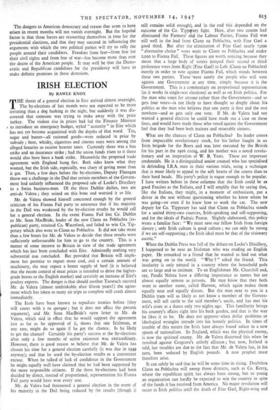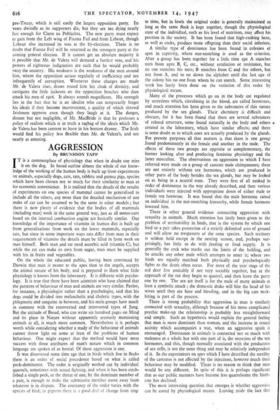IRISH ELECTION
By RAWLE KNOX
THE threat of a general election in Eire arrived almost overnight. The by-elections of last month were not expected to be more irritating than a dog barking in the night, but suddenly it was dis- covered that someone was trying to make away with the prize turkey. The violent rise in prices had led the Finance Minister • to introduce an emergency budget, styled " austerity " in Eire which has not yet become acquainted with the depths of that word. Tea, sugar and butter—all rationed goods—were reduced in price by subsidy ; beer, whisky, cigarettes and cinema seats were among the alleged luxuries to receive heavier taxes. Currently there was a bus strike and an insurance strike ; had the union funds risen to it there would also have been a bank strike. Meanwhile the proposed trade agreement with England hung fire. Both sides knew what they wanted, but the Irish side, especially, was chary of giving more than it got. Then, a few days before the by-elections, Deputy Flanagan threw out a challenge in the Dail that certain members of the Govern- ment had unfairly influenced the proposed sale of Locke's Distillery to a Swiss business-man. Of the three Dublin- dailies, two are anti-de Valera ; they seized on this bone and worried it to life.
Mr. de Valera showed himself concerned enough by the general criticism of his Fianna Fail party to announce that if his majority in the Dail was weakened by the by-election results he would call for a general election. In the event Fianna Fail lost Co. Dublin to Mr. Sean MacBride, leader of the new Clann na Poblachta (re- publican) party, retained Co. Waterford, and failed to win Co. Tip- perary which also went to Clann na Poblachta. It did not take more than a few hours for Mr. de Valera to decide that these results were sufficiently unfavourable for him to go to the country. This is a matter of some interest to Britain in view of the trade agreement which has just been concluded with Eire. Admittedly nothing very substantial was concluded. But provided that Britain will imple- ment her promise to export more coal, and a certain amount of machinery, she may expect a better supply of beef (it is believed that the recent control of meat prices is intended to drive the higher- grade beasts to the English market) and certainly an increase of Eire's poultry exports. The danger is that should another Taoseach succeed Mr. de Valera (almost unthinkable after fifteen years!) the agree- ment which has taken so many air trips to complete will crash almost immediately. _- The Irish have been known to repudiate treaties before (they will retort with a to quoque ; but it does not affect the present argument), and Mr. Sean MacBride's open letter to Mr. de Valera, which said in effect that he would support the agreement just as far as he approved of it, shows that one Irishman, at any rate, might do so again if he got the chance. Is he likely to get the chance? Certainly his party's success at the by-elections after only a few months of active existence was extraordinary.. However, there is good reason to believe that Mr. de Valera has chosen his time for a general election carefully (it was due in 1949 anyway); and that he used the by-election results as a convenient excuse. When he talked of lack of confidence in the Government he might equally well have claimed that he had been supported by the more responsible citizens. If the three by-elections had been decided by direct, instead of proportional, representation his Fianna Fail party would have won every seat.
Mr. de Valera had threatened a general election in the event of his majority in the Dail being reduced by the results (though it
still remains solid enough), and in the end this depended on the outcome of the Co. Tippary fight. Here, after two counts had eliminated the Farmers' and the Labour Parties, Fianna Fail was still well in the lead from Claim na Poblachta, with Fine Gad a good third. But after the elimination of Fine Gad nearly 7,000 "alternative choice" votes went to Clann na Poblachta and under 2,000 to Fianna Fail. These figures are worth noticing because they mean that a large body of voters jumped their second or third preference votes from Right (Fine Gad) to Left (Claim na Poblachta) merely in order to vote against Fianna Fail, which stands between these two parties. These were surely the people who will vote against any Government at any time, simply because it is the Government. This is a commentary on proportional representation (as it works in single-seat elections) as well as on Irish politics. For the man who votes for anyone rather than the Government—and so gets four votes—is not likely to have thought so deeply about his politics as the man who believes that one party is first and the rest nowhere—and so gets only one vote. If Mr. de Veera had not wanted a general election he could have made out a case on these lines, and would have made those who voted against the Government feel that they had been both traitors and miserable sinners.
What are the chances of Clann na Poblachta? Its leader comes from impeccable revolutionary stock, for his father fought in an Irish brigade for the Boers and was later executed by the British for his part in the 1916 rising, and his mother was a noted revolu- tionary and an inspiration of W. B. Yeats. These are important credentials. He is a distinguished senior counsel who has specialised in defending I.R.A. men in their various trials, using a technique that is more likely to appeal to the soft hearts of the courts than to their hard heads. His party's policy is vague enough to be popular. I have written before in these columns that the Irish could be as good Fascists as the Italians, and I will amplify that by saying that, like the Italians, they might, in a moment of enthusiasm, put a driver in the seat without questioning whether he knew where he was going—or even if he knew how to work the car. The new deputy for Co. Tipperary has said that Claim na Poblachta stands for a united thirty-two counties, Irish-speaking and self-supporting, and for the ideals of Padraic Pearse. Slightly elaborated, this policy wears a familiar face: " We must save our fellow Irish from foreign slavery ; only Irish culture is good culture ; we can only be strong if we are self-supporting ; the Irish ideal must be that of the visionary ascetic."
When the Dublin Press was full of the debate on Locke's Distillery, I happened to be near an Irishman who was reading an English paper. He remarked to a friend that he wanted to find out what was going on in the world. " Why ? " asked the friend. This insularity is only natural in a country where the household gods are so large and so intimate. To an Englishman Mr. Churchill and, say, Pandit Nehru have a differing importance as names but are almost equally remote as persons. He may know that they both went to another name, called Harrow, which again makes them equally near and equally distant. But the man next to you in a Dublin tram will as likely as not know a member of the Govern- ment, will sell cattle to the said member's uncle, and has met his wife's sister at a dance only two nights ago. This familiarity brings his country's affairs right into his back garden, and that is the way he likes it to be. He does not approve• when dollar problems or ideological wrangles intrude into his homely politics. In times of trouble of this nature the Irish have always found solace in a new spasm of nationalism. So England, which was the physical enemy, is now the spiritual enemy. Mr. de Valera discerned this when he revolted against Cosgrave's unholy alliance ; but now, Ireland is told, her troubles are due to the fact that Mr. de Valera has, in his turn, been seduced by English pounds. A new prophet must therefore arise.
It can safely be said that he will be some time in rising. Doubtless Claim na Poblachta will sweep those districts, such as Co. Kerry, where the republican spirit has always been strong, but so young an organisation can hardly be expected to win the country in spite of the funds it has received from America. No major revolution will occur in Irish politics until the death of Fine Gael, Right-wing and pro-Treaty, which is still easily the largest opposition party. Its votes dwindle as its supporters die, but they are not dying nearly fast enough for Clann na Poblachta. The new party. must expect to gain from the Left wing of Fianna Fail and from Labour, though Labour also increased its vote at the by-elections. There is no doubt that Fianna Fail will be returned as the strongest party at the coming general election. If it cannot get an absolute majority it is possible that Mr. de Valera will demand a further vote, and his powers of righteous indignation are such that he would probably sway the country. His weakness is the weakness of the men around him, whom the opposition accuse regularly of inefficiency and not infrequently of corruption. Whenever these charges are made Mr. de Valera rises, draws round him his cloak of divinity, and castigates the little jackeens on the opposition benches who dare attack his men of 1916. It always sounds magnificent. His strength lies in the fact that he is an idealist who can temporarily forget his ideas if they become inconvenient, a quality of which shrewd Irishmen approve even though they laugh at it. The danger, distant but not negligible, of Mr. MacBride is that he professes a policy of realism which is in truth a ragbag of the ideals which Mr. de Valera has been content to leave in his bottom drawer. The Irish would find his policy less flexible than Mr. de Valera's, and not nearly as amusing.































 Previous page
Previous page